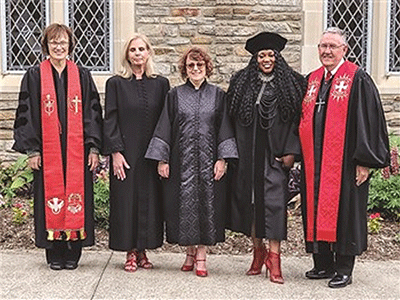Even when she went to seminary, the Rev. Dr. Charlotte Williams, DMIN (2023 Graduate of Gammon Theological Seminary) did not want to be a preacher. “That was not on my radar. It was not on my bucket list,” she says.
Growing up in poverty with an addicted parent, Williams saw and experienced things that put her on a different quest: to build community and stand against the oppression of Black people.
Gammon Theological Seminary is one of the 13 United Methodist seminaries supported by the Ministerial Education Fund apportionment of the United Methodist Church.
In 2000, she completed her master’s degree in community psychology from Florida A&M University. In 2007, she received her master’s in divinity from Gammon Theological Seminary.
“I went to Gammon actually to find out more about God and our people more so than myself,” she said. “I informed all my professors I was not looking to be a pastor.”
Along the way, she became a United Methodist preacher and a Georgia state social worker who has never had it easy -- but who stays on the difficult path because she has seen “the hand of God” in her journey.

“Sometimes I question myself and my sanity because it has not been a smooth transition at all,” Williams said recently, as she sat in the fellowship hall of one of the two churches she serves. “It has been a fight uphill every second ... So you have to have a sense of a higher calling to be here.”
In the summer of 2020, Williams decided to return to Gammon Theological Seminary after the murders of George Floyd, Breonna Taylor, and Ahmaud Arbery. She was frustrated when the violence didn’t seem to move the church to take radical, transformative action against racism. She hoped Gammon would help her discern “how to articulate what needs to be done.”
In May 2023, Williams graduated again with a doctorate in divinity. A few weeks later, she walked across the Lake Junaluska stage with “Rev. Dr.” in front of her five names during the ordination service: Charlotte Shynellen Nzingah Nyaboke Williams. Three of the names she has had since birth. Two are African names (Nzingah and Nyaboke) given to her by African persons in more recent years on separate occasions.
Williams is now a pastor of two Black churches in Chattanooga, both part-time appointments. For the last 10 years, she has led Eastdale Village Community United Methodist Church.
Her father, Rev. Stanley Reuben Williams, a former drug addict, served a few other churches before landing at Eastdale Village Community United Methodist Church in 1995. He led Eastdale for 18 years until his death in 2013
But as her father’s health began to wane due to kidney disease, he asked his daughter to “step up” and help him fulfill his pastoral obligations.
“I did it out of duty to my father, and as I did that, people told me I had a gift. I would say the community recognized it before I did,” she said.
After she was ordained as an elder at Holston Annual Conference in June 2023, Williams was already into a new ministerial year when she was asked to take on a second appointment.
In the Summer of 2023, Williams walked into Bethlehem-Wiley United Methodist Church, a historic downtown church that has seen better days. The congregation was currently grappling with financial hardship and the recent loss of several members along with the former pastor. When she was asked (by the district superintendent) to lead the church, she saw it as an example of the “ancestral obligation” that has been threaded throughout her life.
“When you are a Black person in America, you actually have an obligation to help other Black people, because it was other Black people before us who lived and endured the hardships so that we can be here,” she said.
After she met with Bethlehem-Wiley’s members, she said, “I’ll give it a try.”
Now she’s beginning a new journey with the Bethlehem-Wiley congregation, Williams knows “a massive amount of work” is ahead. She is “praying to God for strength and resources,” but she didn’t have it easy, either, when she was appointed to Eastdale after her father’s death. Several members left the church then because she was a woman and too young, in their view, to be a pastor.
That experience and many others have prepared her for the next chapter, she said.
“Bethlehem-Wiley and these members have been here for a number of years, so we’re going to do the best that we can to make sure they continue,” she said. “We’ve got a lot of work to do, but that’s what we’re going to do. We’re going to make bricks with no straw.”
excerpt from a story by Annette Spence, editor of The Call, Holston Annual Conference
One of seven apportioned giving opportunities of The United Methodist Church, the Ministerial Education Fund is at the heart of preparing people for making disciples of Jesus Christ for the transformation of the world. The 13 United Methodist seminaries help students to discover their calling through the challenging curriculum. The fund enables the church to increase financial support for recruiting and educating ordained and diaconal ministers and to equip annual conferences to meet increased demands. Please encourage your leaders and congregations to support the Ministerial Education Fund apportionment at 100 percent.





